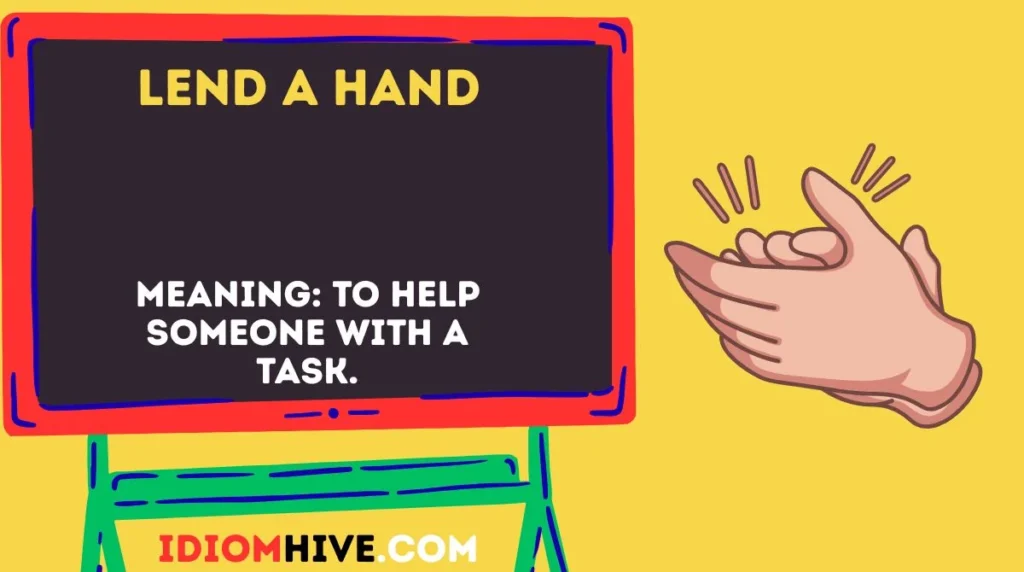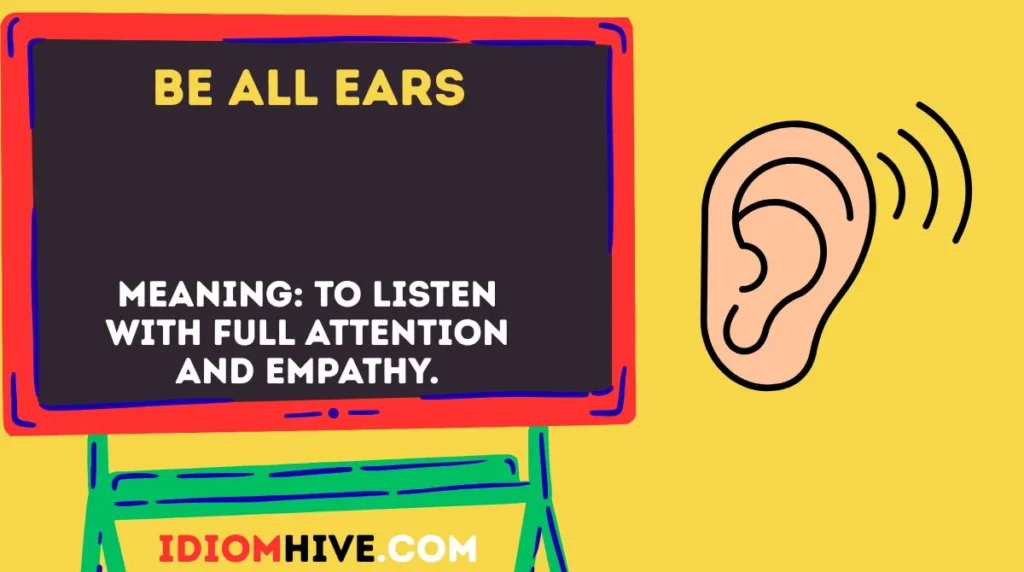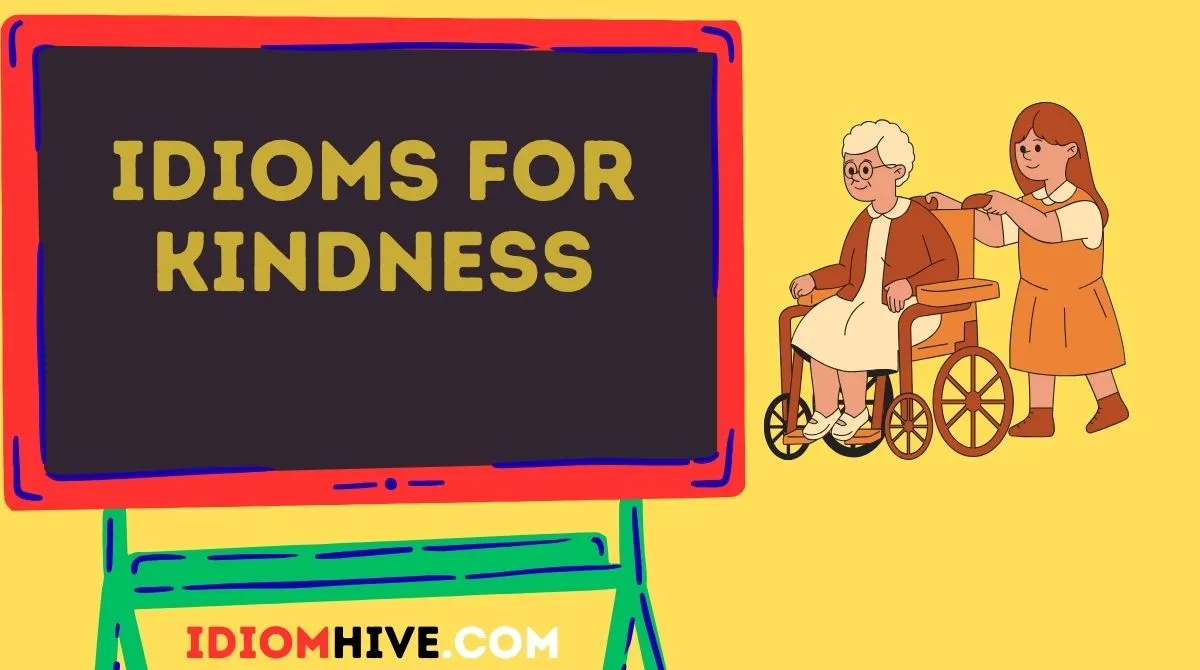Idioms are colorful phrases that go beyond their literal meanings, adding charm, culture, and creativity to everyday English. They help people communicate emotions, experiences, and wisdom in a more engaging way.
One of the most beautiful themes captured in idiomatic expressions is kindness. Kindness is a universal value—whether it’s a small gesture of help, a caring word, or an act of compassion, it connects people on a deeper level.
Using idioms for kindness not only enriches your vocabulary but also shows warmth in conversations, writing, and even professional communication.
Instead of saying “be kind,” you can say “lend a hand” or “wear your heart on your sleeve”—phrases that add personality and emotion to your words.
In this article, you’ll discover some of the most powerful idioms for kindness, grouped into easy categories, each explained with meanings, examples, alternatives, and practical notes.
Did You Know?
The English language has over 25,000 idiomatic expressions—and many of them reflect kindness, compassion, and generosity. This shows how deeply kindness has always been valued in human interaction!
Idioms About Helping Others
Lend a Hand

Meaning: To help someone with a task.
Example: “Can you lend a hand with these boxes?”
Alternative: Give a helping hand.
Reflection: Common in everyday conversations, polite and friendly.
Do Someone a Good Turn
Meaning: To do something kind or helpful for someone.
Example: “He really did me a good turn by driving me home.”
Alternative: Do a favor.
Reflection: Often used informally.
Go Out of Your Way
Meaning: To make extra effort to help someone.
Example: “She went out of her way to make me feel welcome.”
Alternative: Bend over backward.
Reflection: Used in both formal and informal contexts.
Bend Over Backward
Meaning: To try very hard to help or please someone.
Example: “The teacher bent over backward to support her students.”
Alternative: Pull out all the stops.
Reflection: Polite, can be used at work or in personal life.
A Shoulder to Cry On
Meaning: Someone who listens and gives comfort.
Example: “After her breakup, her sister was a shoulder to cry on.”
Alternative: Be there for someone.
Reflection: Usually personal and emotional situations.
Come to the Rescue
Meaning: To help someone in a difficult situation.
Example: “The lifeguard came to the rescue just in time.”
Alternative: Save the day.
Reflection: Works in casual and storytelling contexts.
Save the Day
Meaning: To prevent a failure by helping.
Example: “Your notes saved the day before the exam.”
Alternative: Bail someone out.
Reflection: Informal and cheerful.
Give Someone a Break
Meaning: To treat someone with kindness or forgiveness.
Example: “Give him a break, he’s new at this job.”
Alternative: Cut some slack.
Reflection: Informal, daily conversations.
Lighten the Load
Meaning: To make someone’s work or stress easier.
Example: “Hiring an assistant really lightened her load.”
Alternative: Ease the burden.
Reflection: Semi-formal, often used in workplaces.
Idioms About Generosity and Big-Heartedness
Big-Hearted
Meaning: Very kind and generous.
Example: “She’s a big-hearted woman who always donates to charity.”
Alternative: Warm-hearted.
Reflection: Commonly used in compliments.
Warm-Hearted
Meaning: Kind and caring in nature.
Example: “He’s a warm-hearted neighbor who looks after everyone.”
Alternative: Kind-hearted.
Reflection: Daily use, personal contexts.
Kind-Hearted
Meaning: Having a kind and generous nature.
Example: “That kind-hearted nurse stayed after hours.”
Alternative: Gentle soul.
Reflection: Common in storytelling and compliments.
Open-Handed
Meaning: Generous with money or help.
Example: “He’s open-handed when it comes to charity.”
Alternative: Free with money.
Reflection: Semi-formal, often about generosity.
Give the Shirt off One’s Back
Meaning: To give away even your own things to help.
Example: “She’d give the shirt off her back if you needed it.”
Alternative: Selfless giver.
Reflection: Informal, emphasizes extreme generosity.
Share the Wealth
Meaning: To distribute benefits or advantages to others.
Example: “The company shared the wealth with employee bonuses.”
Alternative: Spread the joy.
Reflection: Often in financial or success contexts.
Bread and Butter Kindness
Meaning: Everyday acts of kindness.
Example: “Helping an elderly neighbor is bread and butter kindness.”
Alternative: Small acts of love.
Reflection: Casual and friendly.
Kindness of Strangers
Meaning: Receiving unexpected help from unknown people.
Example: “She survived thanks to the kindness of strangers.”
Alternative: Good Samaritan.
Reflection: Popular in storytelling.
Salt of the Earth
Meaning: Very kind, good, and dependable person.
Example: “My grandmother was the salt of the earth.”
Alternative: Down-to-earth.
Reflection: Often used to describe humble and genuine people.
Golden Heart
Meaning: Having a very kind and generous heart.
Example: “She has a golden heart and helps everyone in need.”
Alternative: Heart of gold.
Reflection: Widely used in compliments.
Idioms About Compassion and Understanding
Walk in Someone’s Shoes
Meaning: To understand someone’s feelings by imagining being them.
Example: “Try walking in his shoes before judging him.”
Alternative: Put yourself in their place.
Reflection: Used in both formal and informal advice.
Heart Goes Out To
Meaning: To feel sympathy for someone.
Example: “My heart goes out to the victims of the flood.”
Alternative: Feel for someone.
Reflection: Often used in formal speeches or writing.
Wear Your Heart on Your Sleeve
Meaning: To show emotions openly.
Example: “She wears her heart on her sleeve when it comes to helping.”
Alternative: Open book.
Reflection: Common in personal contexts.
Kind Words Cost Nothing
Meaning: Being kind in speech doesn’t require effort or money.
Example: “Remember, kind words cost nothing but mean a lot.”
Alternative: Words can heal.
Reflection: Proverbial, inspirational tone.
Have a Soft Spot For
Meaning: To feel affection or sympathy for someone/something.
Example: “She has a soft spot for animals in need.”
Alternative: Weakness for.
Reflection: Daily life, informal.
Gentle as a Lamb
Meaning: Extremely gentle and kind.
Example: “The teacher is as gentle as a lamb with kids.”
Alternative: Soft as silk.
Reflection: Often used in comparisons.
Be All Ears

Meaning: To listen with full attention and empathy.
Example: “I’m all ears if you want to talk about it.”
Alternative: Attentive listener.
Reflection: Informal, friendly tone.
Pat on the Back
Meaning: Praise or recognition for someone’s effort.
Example: “He deserves a pat on the back for his kindness.”
Alternative: Give credit.
Reflection: Informal or casual workplace use.
A Good Egg
Meaning: A genuinely kind and dependable person.
Example: “She’s a good egg—always ready to help.”
Alternative: Nice person.
Reflection: Informal, affectionate.
Idioms About Everyday Acts of Kindness
Spread the Love
Meaning: To share kindness and happiness.
Example: “Let’s spread the love this holiday season.”
Alternative: Pass it on.
Reflection: Very informal, friendly use.
Pass It On
Meaning: To continue the chain of kindness.
Example: “Someone helped me, so I’ll pass it on.”
Alternative: Pay it forward.
Reflection: Common in kindness campaigns.
Pay It Forward
Meaning: To do a good deed in return for kindness received.
Example: “I bought her coffee, and she paid it forward to another.”
Alternative: Pass kindness along.
Reflection: Inspirational and widely used.
Do Unto Others
Meaning: Treat others as you’d like to be treated.
Example: “The rule is simple: do unto others as you’d have them do unto you.”
Alternative: Golden rule.
Reflection: Often used in moral or religious settings.
Acts of Kindness
Meaning: Small, thoughtful actions that help others.
Example: “Random acts of kindness can change someone’s day.”
Alternative: Good deeds.
Reflection: Common in campaigns and daily life.
Little Things Mean a Lot
Meaning: Small acts of kindness have great value.
Example: “A smile shows that little things mean a lot.”
Alternative: Small gestures count.
Reflection: Used in both formal and informal contexts.
Good Samaritan
Meaning: A person who helps others selflessly.
Example: “A good Samaritan stopped to fix her flat tire.”
Alternative: Kind stranger.
Reflection: Common phrase in storytelling and news.
A Ray of Sunshine
Meaning: Someone who brings joy and kindness.
Example: “Her cheerful nature is a ray of sunshine.”
Alternative: Light in the dark.
Reflection: Informal, affectionate.
Spread Sunshine
Meaning: To bring happiness to others.
Example: “She spreads sunshine wherever she goes.”
Alternative: Brighten someone’s day.
Reflection: Informal, poetic.
How to Use These Idioms in Daily Life
- In Speaking: Use idioms naturally in conversations to show warmth. For example, instead of “help me,” say “lend me a hand.”
- In Writing: Idioms make blogs, essays, and stories lively. For example, “Her kindness was a ray of sunshine in the office.”
- In Professional Use: Idioms like “go out of your way” or “lighten the load” can be used politely in workplace emails and meetings.
Common Mistakes Learners Make With Idioms
- Wrong Context:
❌ “He gave me a shoulder to cry on during the meeting.”
✅ Correct: “She was a shoulder to cry on after my breakup.” - Literal Meaning:
❌ “He lent me a hand—just one hand.”
✅ Correct: “He lent me a hand with the heavy luggage.” - Mixing Idioms:
❌ “She bent over a shoulder to cry on.”
✅ Correct: Use only one idiom properly: “She bent over backward to help.”
FAQs
1. What are idioms for kindness?
Idioms for kindness are expressions that describe helpful, generous, or compassionate actions in creative ways.
2. Can idioms for kindness be used in formal writing?
Yes, some idioms like “lighten the load” or “do unto others” work well in essays, speeches, and workplace communication.
3. Are idioms for kindness used in everyday speech?
Absolutely! Phrases like “lend a hand” or “good Samaritan” are very common in daily English.
4. Do idioms for kindness exist in other languages?
Yes, almost every language has idioms that express kindness, though the phrases differ culturally.
5. How can I practice idioms for kindness?
Try using one idiom a day in your conversations or writing to make it a natural habit.
Conclusion
Kindness is a universal language, and idioms beautifully capture its spirit. From “lend a hand” to “a ray of sunshine,” these expressions bring warmth, depth, and culture to English conversations.
By practicing and using idioms for kindness, you not only enrich your vocabulary but also inspire others with your words.
So next time you want to express kindness, go beyond plain speech—use these idioms to spread love, joy, and compassion.










